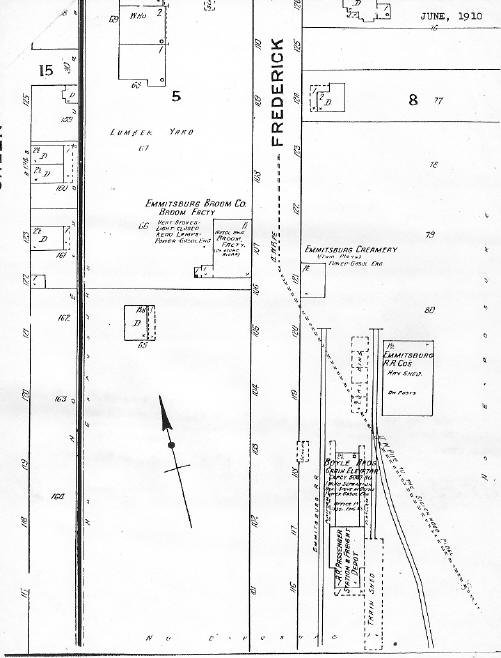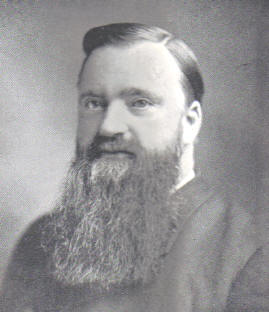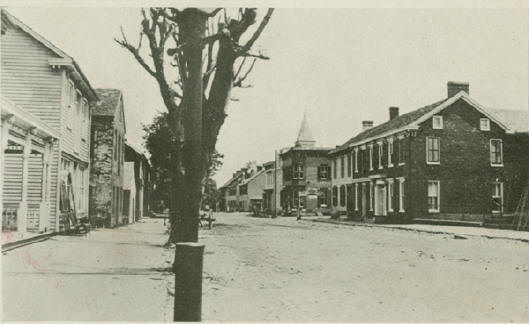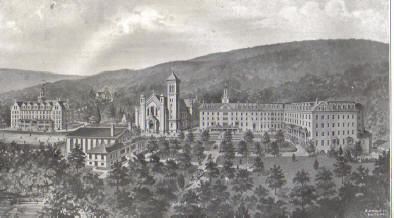|
The Contralto
Rev. Charles Maloy, C. M.
St. Joseph's Parish, Emmitsburg, Md.
Chapter 7 | Chapter 6 | Chapter 1
On his way to the office after luncheon the Professor read over his notes. He had prepared a series of questions and
answers in a facetious vein which he hoped would call the attention of the paper's readers to the utter demoralization that prevailed in the passenger
traffic of the Western Maryland Railroad, because it had been made subservient to the transportation of coal. One of these read: "Does the Western Maryland run on schedule?
No, Dear Reader, the Western Maryland does not run on schedule and most of the time does not run on the track as witnessed by the frequency of wrecks. The
conductors have orders to stop at every wood to search for the schedule, hence train 9 on Tuesday evening ran away from Mr. Buffington and was compelled
to back a mile to pick him up." This last was in reference to a recent occurrence which had much amused the few Emmitsburg passengers on board.

Map showing location of Emmitsburg Railroad Station in Emmitsburg Station
Broom Factory is Present Day Carriage House Inn
(Click of image for larger version)
He also showed that the mail service despite the Federal regulations was in scandalous condition; that the recent wreck
in which forty persons had lost their lives was likely to be duplicated at any point of the system, because of the dilapidated condition of the roadbed.
He chuckled to himself on viewing the progress of his mind in the new phase of "muck-raking."
His next article would be on the matter of a living wage, in which he would hint at evils nearer home. He was in the
process of recalling the teachings of economists from Mill and Ricardo to George and Ely, and marshalling their arguments when he met up with Uncle
Bennett. The old man was looking glum for one of such ordinary placidity and on being greeted, abruptly asked: "Got the right time, Professor?"
"I have some time, Uncle, but I shall not vouch fur its correctness," showing his watch to the old fellow, neglecting
to inform him that it had been set that very morning in accord with the town clock.
Bennett squinted at it then up at the clock exclaiming: 'I 'Knowed it! their darned old turnips can't keep the right
time. Now I'll bet that watch is full jewelled, ain't it?"
"I've never investigated," he declared, and observing the expectant look on his friend's face, unhooked the watch from
the fob and handed it over. The works were examined in every detail, the timepiece returned with much praise as to its perfection, and many disparaging comments on the quality of the
general run of chronometers in Emmitsburg.
"Are you busy just now, Professor?"
"Not particularly, is there anything I can do for you?"
"I got a Olmstead's Philosophy down to the house, I'd like you to come and see if I ain't right in my calculations."
Many years having elapsed since the Professor had looked into a text-book of physics, he was by no means certain he
could follow the problems of time reckoning, so excused himself with an assurance that he would find opportunity to take up the question later. Moving
away he was halted with:
"Hear you're getting up theat'cals."
"Yes," with a note of surprise at the celerity with which news spread in the village.
"Why not use the church hall over there? that's a good place, all you need is to put in a stage and some scenery. I
built that hall and there ain't been a nail drove since, that I didn't sup'intend."
"We shall see about it."
At the office, he was met by Sterling Galt who laughingly chid him on the tardiness of his appearance at the same time chaffing
about the stronger attraction of a beautiful young woman and the morning sunshine versus newspaper work and the tobacco laden atmosphere of the
editorial room. The reference to the physical charms of his friend brought a schoolboy blush to the Professor's face.
He was not left a victim of his embarrassment for long, Mr. Galt handing him some copy for reading and approval. It
contained a glowing account of the newly founded theatrical society, which would soon be presenting the highest expressions of the Thespic art for the
amusement and enlightenment of the citizens of Emmitsburg and the surrounding country. Two public spirited gentlemen of Metropolitan experience had
taken the matter in hand thereby guaranteeing the utmost perfection of artistic finish to the venture. The paper bespoke the heartiest co-operation of
the young people in the various productions contemplated and the aid of one and all its readers by their liberal patronage. More detailed information
was promised in subsequent issues.
While reading it a smile of amusement lighted up the Professor's countenance. At the finish he re-marked on the speed
with which events rushed to consummation in the town. He assured the Editor the matter had been merely a topic of conversation between himself and Mr.
Halm, he not having had an opportunity to consult the Pastor.
"Nevertheless it was a happy inspiration. Go ahead with it, it will help out our social regeneration immensely."
"Run the copy then, we may as well plunge. I presume the Rector will approve and allow us to use his hall."
"Of course he will approve, he is as anxious as we are for the resurrection of this town. The difficulty with him is he
does not know how to go about it. He is not a fighting man, he has an exaggerated idea of a heavenly hereafter garnered in his years of devotion and
self-sacrifice and cannot come down to the level of earthly things."
"He is the truest friend I ever had," declared Harry with emotion. "I knew him when he presided over one of the largest
churches in the city, but was not politician enough to hold it. The Governor, as I call him, has seen a great deal of the inherent smallness of
humanity, and the wonder is that he retains so optimistic an outlook on life. Whenever I see or think of him I am inclined to make an act of faith in
the Deus absconditue, the hidden God, who from behind the veil regulates the course of events."
With this mutual eulogy of their friend the two turned to their respective writings. For half an hour there was silence
in the sanctum, with outside the running off of sales-bills. Mr. Higbee laboriously paged "Fugitive Fancies," a book of verse which had emanated from
the brain of a local songster, and which an admiring wife was having printed, hoping thus to satisfy the clamors of an imaginary world. Stopping in his
measurements, Higbee grinned irreverently, exclaiming: "It's a shame to take the money."
 The silence in the editorial department was broken by the entrance of
Father Flynn, President of the Mount. He was a
man of large proportions with a flowing red beard which, though no ornament in itself, served to hide a weak mouth and very bad teeth. He and the
Professor had met on several occasions at the parsonage, both, from an unfathomable antipathy, fighting shy of each other. One or two arguments
precipitated by the Rector had not tended to narrow the breach. He saluted Harry gruffly in his deep voice, which, from the first, had caused the latter
to summarize him as Vox et praeterea nihil. The silence in the editorial department was broken by the entrance of
Father Flynn, President of the Mount. He was a
man of large proportions with a flowing red beard which, though no ornament in itself, served to hide a weak mouth and very bad teeth. He and the
Professor had met on several occasions at the parsonage, both, from an unfathomable antipathy, fighting shy of each other. One or two arguments
precipitated by the Rector had not tended to narrow the breach. He saluted Harry gruffly in his deep voice, which, from the first, had caused the latter
to summarize him as Vox et praeterea nihil.
His address to the Editor was more diffuse, the congratulation he offered on the brightness and up-to-date appearance
of the Chronicle, tinged with flattery. Everyone at the college was reading it, enjoying very much the articles, especially those attacking the W. M.
This was a move which had the hearty approval of the faculty as each member found it very inconvenient waiting for delayed trains to and from the city.
Mr. Galt thanked the Doctor, offering the columns of the paper for the expression of any views the college might wish to publish, and:
"By the way, Doctor," he continued, "a letter from you will help in our trouble with the Western
Maryland"
"Oh no, sir, we make it a rule never to enter the public prints," hastening to ask for some job-work which was the
excuse for his call. While the Editor went in search of Higbee, Flynn turned his attention to the Professor, who had taken no part in the conversation,
endeavoring to act as a casual caller himself.
"Rather progressive paper for a country village, don't you think?"
"Very, Mr. Galt has advanced views of journalism."
"Quite Addisonian in certain lines, that essay on 'Love and Humor, Wit and Hatred,' for example?"
"His motto seems to be, 'Lift the people to your level,'" looking Father Flynn straight in the eyes.
Here entered Higbee with the printed matter, which he proceeded to wrap. The President, after one contemptuous glance
at his soiled overalls, asked:
"How are things in the printing department, young man?"
"Everything lovely," the end of the string between his teeth, "our new press is running like a charm, job-work and
subscriptions are piling up giving us all that we can carry, and with a few more improvements we shall have—"
"Here, here, young man, my time is valuable, wrap up that package."
The insult was almost too great for Higbee to bear but further than going white he did nothing but look at Harry. He
had dared to enter into converse with the potentate, he a mere man in overalls. The Professor was not in the least daunted, however, and asked with a
drawl:
"Didn't we beat you at football the year you graduated from Frankly & Marshall M., Louis?"
"I think you did," readily accepting the cue. "By the way, Doctor, do you have games with the U. of P.?"
"I am not interested in athletics," taking his package and stamping out of the office.
Higbee indulged in some strong language, then shook the Professor's hand, "Gad! I would give a good deal to be as quick
as you in handling that upstart."
"Forget it, old man, we shall deliver a few stronger ones than that before we're through."
The foreman went back to work somewhat mollified though the wound still rankled, causing him to excogitate plans of
revenge. The editors worked for half an hour longer, then Harry asked:
"Why doesn't Father Flynn wish to attack the Western Mryland.?" "Favors in the matter of coal delivery," without looking up.
"Thought as much, how does he stand in politics?" "Hand and glove with Gerry, the Judge is a graduate of the
Mount,
you know."
"An honor to his alma mater from what I can hear, they say a more venal rascal never decided a case."
"A slick article, has the church men with him from Genesis to Revelations. Before the last election he was on every
religious platform throughout the county, the clergy are with him to a man. You know the sequel."
"Why don't you go after him?"
"No use, he's elected for ten years, and we have no recall."
Declaring he had worked enough for one afternoon, the Professor walked out into the early evening air. Looking up and
down there was nothing in the sleepy street with its dead level of unchangeableness to attract his attention, so he decided to walk east (Miss Tyson
lived in that direction).

Main Street 1909 - Looking East
Passing the Dental Parlor, the proprietor hailed him:
"Just a moment, Professor, wait 'til I put the finishing touches on Roy Strong's Sunday teeth, I want to talk to you."
"Sunday teeth?"
"Oh yes, they are ail the rage in Emmitsburg."
"In what do they differ from everyday teeth?"
"All who wear what they call store teeth hereabouts, and can afford it, have two sets, a plain one for week days and
one decorated with gold fillings for Sundays."
"They are surely slaves of fashion in these parts. Mrs. Hoppe told me all the boys and girls have store teeth. Why
don't you instruct them in the matter of preserving their natural ones?"
"Most of them are too poor, they think it cheaper to let the natural teeth decay, then get false which will last them
the remainder of their lives."
Dr. Forman ground and polished while Harry sat and thought of the refinements of systematic pauperism which were meeting
him every hour he spent in this territory. Yet people who visited for a day or two went away under the impression that the village was an Arcadia
maintained by the generosity of the educational institutions to the southward. It was heartrending to behold the living lie. He was on the point of
requesting the dentist for more details but thought better of it. The teeth finished, their price carefully noted in the account book, Forman seated
himself backward on a chair opposite the Professor. We dare not insert the various expletives and punctuations he made use of, for the reader, who hears
them every day on the street, would be offended with their appearance in print.
"Hear you're starting a dramatic society." "I plead guilty."
"Just the thing this burg needs, what are you going to begin with?"
"We haven't fully determined as yet, but I think it will be an operetta by Mr. Halm. I believe you are in the
prospective cast as basso."
"Good Lord! I can't sing for sour pickles, and don't let Halm run things, he'd break up a nigger funeral."
"Isn't he popular?"
"Popular! why the girls all think him a joke." "We do not intend to have the ladies do the thinking for us," dryly.
"Why not start with a play? 'A Night Off' or 'Esmeralda,' or something of that sort?" The dentist had studied for his
profession in the city.
"The inception of the idea was wholly Mr. Halm's, he suggesting the operetta, I could not be ungracious enough to make
a change. If we carry through the first venture we can easily follow with others."
"Is Marion Tyson to have the lead?"
"I understand Miss Tyson is to have that part according to Halm's present programme," wincing a little at hearing her
first name taken so freely.
"She can do it all right, but I'll bet you'll have to fish for a soprano, Mae Lansinger won't sing."
"Why should Miss Lansinger object?"
"In the first place, she will not risk comparison with Marion, and, for another reason, she's got to be the whole works
or she won't play."
"I presume Halm shall find someone to take the part should it be necessary to clash with her." "There's Vinny Siebold if she would only do it." "Perhaps she will."
"I don't know, Vinny's a peculiar girl, doesn't go in much for society, old man's a lawyer whose local reputation isn't
very good."
"I am afraid there are few reputations which will bear scrutiny if the local estimate be accepted, but as far as I am
concerned everyone is unimpeachable and we shall accept any and all at that rating."
He had just delivered himself of this last when Doctor Brawner stuck his head in the door. The physician was tall,
round-shouldered, of a pasty complexion, with shifting eyes and tawny moustache. He was not handsome to look at, grouchy in disposition, but honest
withal, charitable to a fault and the shift in his eyes came more from nervousness than chicanery. Seeing the Professor, he would have withdrawn but was
prevented by a hasty:
"Come in, Doc, come in, sit down and rest your hands and face, you've met the Professor."
"Yes, yes; just been out to the Mount, new fellows homesick, got the blues. Give 'em a dose of calomel and a few
days' loaf in the infirmary, then they're all right."

Mount Saint
Mary's College around the turn of
the Century
"We were just talking about forming a dramatic club, Doc, what do you think of it?"
"Can't do it, haven't the talent, can't draw crowd enough to meet expenses."
"I don't know about the talent, Doc, don't see why our boys and girls aren't just as intelligent as the next."
"It isn't that, you couldn't stand the criticism of the Mount and St. Joes."
Dr. Forman consigned the Mount and St. Joes to a much warmer climate than Emmitsburg enjoyed, and Dr. Brawner excused himself
saying he must put up his horse. When he had gone the dentist continued:
"That old fool is like the rest of them around here, they think the world would cease to revolve were the Mount
and St. Joes to withdraw their permission. Ye gods! it would be an awful shock were they to awake and discover the sun rose with-out leave of Father Flynn
and the Lady President."
"Did no one try ever to waken them?"
"Yes, they tried it, but—well, you see with what result. A former pastor began a crusade against what he called the
bucket-brigade, the children going to the kitchens for cold scraps, started a little factory to furnish work and fair wages and—he is on the foreign
mission now, I believe."
For some minutes they sat each engrossed with his own thoughts, an unusual silence prevailing in the dental parlor. The
Professor seriously contemplated the foregoing of all the works that were crowding in upon him and the giving himself entirely to the matter of his
personal redemption. The town's problem seemed too great for his weak efforts, and besides what was Emmitsburg to him? Might it not be better to leave
the people in their pauperism than to introduce the element of discontent, which once it had petered out would leave their last state worse than the
first? He had come to seek his own reform not to effect reform in the village. This led him back to the battle with his besetting sin and he began to
realize that during the past few days, or since he had occupied himself with external matters, the struggle with the demon was not half so acute. He had
gone to sleep each night with less difficulty, was eating better, the blood seemed to course through his veins with more vigor. The burning sensation at
his wrists and the base of his skull had entirely disappeared while the pleasure of a cool drink of mountain water surpassed the most seductive mixed
drink. The dentist broke in on his revery:
"When do you have the first meeting?"
"As soon as we can make it known to those who might care to take part."
"They all know it now, call your meeting for this evening. They will all be there."
"This evening at seven-thirty, then."
Chapter 8
Have your own memories of Emmitsburg of old?
If so, send them to us at history@emmitsburg.net
|